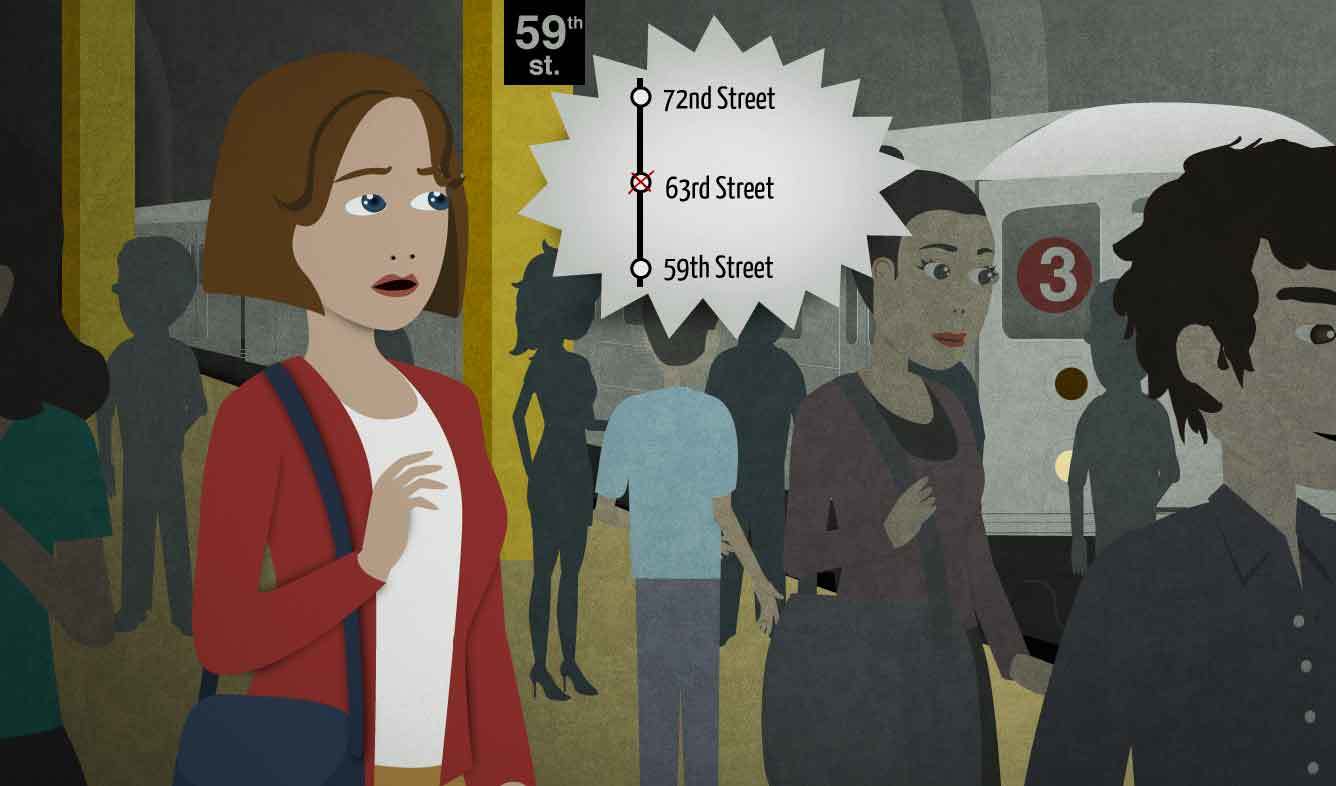“Due to construction, the uptown Bronx-bound 1 train will not be stopping at 63rd Street. The next stop is 72nd Street.”
You're waiting for a train in the subway station. You hear an announcement about some service changes.
Due to construction, the uptown Bronx-bound 1 train will not be stopping at 63rd Street. The next stop is 72nd Street.
Want Video and Sound? Follow us on YouTube

a (somewhere)-bound (bus/train/airplane)
This phrase expresses the direction that something is traveling in:
There's a Hong Kong-bound flight leaving in an hour and a half.
No, don't take the south-bound train.
You can also say "bound for ___":
Is this bus bound for New Jersey?
due to (something)
"Due to ___" explains expresses the cause of something.
You use "due to" in slightly formal situations. For example, an announcement on a train might include "due to ___":
Due to construction, the uptown 1 train will not be stopping at 50th Street, 59th, or 63rd. The next stop is 72nd Street.
The thing that follows "due to ___" should be a noun. As another example, if something happened because it's raining, you don't say "due to it's raining". You have to use a noun:
The game has been postponed due to rain.
If you want to say that the reason for something was an action, you have to find a way to make that action into a noun. For example:
The project was a failure due to lack of communication between team members.
The action in this sentence is "team members didn't communicate". But to put it in noun form, you say "lack of communication. You could also say:
The project was a failure due to team members not communicating.
In this example, "team members not communicating" acts as a noun.
"Due to" can fit into a sentence two different ways:
- (something) is due to (something)
- (something happens) due to (something)
construction
"Construction" means building things like buildings, roads, and so on.
We often use "construction together with another word like this:
There's a construction crew out on the street. I wonder what they're doing.
Construction sites are full of danger.
But you can also use "construction" by itself to mean a construction project.
Traffic is backed up today because of construction.
an uptown train
In some cities, the northern part of town is called "uptown". For example, New York City has an "uptown" which is the northern half of the island of Manhattan.
An "uptown train" is a train which is heading toward the north.
the next stop
Each place where a bus or train stops is called "a stop". You can count the number of stops between two places:
It's only three stops from here on the A train.
When you're riding a train or bus, you will hear announcements about the current stop and the "next stop":
Now stopping at Six Points. Next stop is Velvet Street Mall.
(number)st/(number)nd/(number)rd/(number)th
When you're counting the order of things, we use counters:
- 1st (first)
- 2nd (second)
- 3rd (third)
- 4th (fourth)
- 5th (fifth)
- 6th (sixth)
- 7th (seventh)
- 8th (eighth)
- 9th (ninth)
- 10th (tenth)
- 11th (eleventh)
- 12th (twelfth)
- 13th (thirteenth)
For any numbers after 13, we use the counter that goes with the last digit:
- 23rd (twenty-third)
- 92nd (nintety-second)
